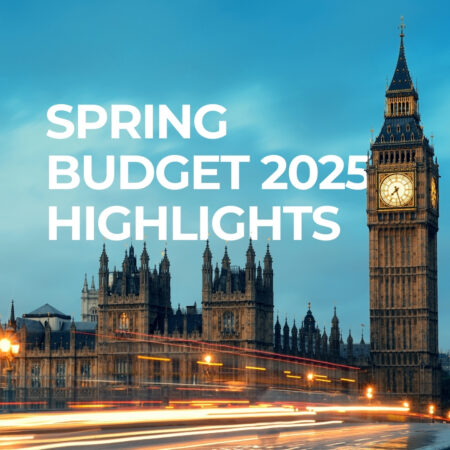Chancellor of the Exchequer, Rachel Reeves, delivered the Spring Statement on Wednesday 26 March 2025. Ahead of the event, she reaffirmed her commitment to a single major fiscal event each year, aiming to provide families and businesses with stability and certainty around tax and spending changes, supporting the government’s growth mission. As promised, there were no major tax announcements in this year’s Spring Budget.
Making Tax Digital (MTD) for Income Tax
Following the introduction of MTD for VAT in 2019, the Spring Budget announced the second stage of their MTD rollout: Making Tax Digital for Income Tax Self-Assessment (MTD for ITSA). MTD for income tax will extend to taxpayers with turnover of more than £20,000 from April 2028. Commercial software will also be required to submit a tax return under MTD, rather than an HMRC service.
From April 2025, stricter late payment penalties will apply for VAT taxpayers and Income Tax Self Assessment taxpayers joining MTD:
- 3% penalty at 15 days overdue
- Additional 3% at 30 days overdue
- 10% per annum after 31 days
Closing The Tax Gap
The government plans to intensify its efforts to tackle tax evasion, aiming to increase the annual tax revenue by £1 billion. Measures include increasing the number of tax fraudsters charged each year by 20%.
Inheritance Tax
Inheritance Tax remains unchanged in the Spring Budget, with the nil rate band continuing to be frozen at £325,000 and the residence nil rate band at £175,000 until April 2030.
Additionally, from April 2027, unused pension funds and death benefits will be included in estates for IHT purposes, impacting estate planning for many individuals.
Growth (Economy)
The Office for Budget Responsibility (OBR) halved its 2025 UK growth forecast from 2% to 1% but raised projections for later years, expecting 1.9% growth in 2026, 1.8% in 2027, 1.7% in 2028 and 1.8% in 2029. The government aims to shift from a £36.1 billion deficit in 2025-26 to a £9.9 billion surplus by 2029-30.
Defence Spending
The Spring Budget confirms that UK defence spending will increase to 2.5% of GDP by April 2027. As part of this plan, the Ministry of Defence will receive an additional £2.2 billion next year to address rising global uncertainty.
Housing and Construction
The Spring Statement includes £2 billion for social and affordable housing in 2026/27, aiming to build 1.5 million homes in England. This will fund up to 18,000 homes and allow councils and housing associations to bring forward new developments.
Additionally, a £625 million investment in construction skills will expand training programmes to address worker shortages, supporting the government’s housing and infrastructure plans.
Welfare
The government plans to reform the welfare system, aiming to save £4.8 billion by 2029/30. Key Spring Budget changes include:
- Freezing the Universal Credit health element for existing claimants until 2029/30 and reducing it to £50 a week for new claims in 2026/27.
- Increasing the Universal Credit standard allowance above inflation, reaching CPI + 5% by 2029, rising from £92 to £106 per week.
- Introducing more checks on savings, earnings, and expenses for Universal Credit claimants.
- There is £1 billion for employment support to help people back into work and £400m for jobcentre support.
The reforms are expected to push 250,000 more people, including 50,000 children, into poverty by 2030.
Other Announcements:
Inflation– projected to fall to 2% by 2027, though the OBR expects it to average 3.2% in 2025.
Government Efficiency – £3.25 billion transformation fund to reduce running costs, including voluntary exit schemes for civil servants.
HMRC Recruitment – 500 new compliance staff in 2025, plus 600 debt management staff in 2026.
State Pension Triple Lock – a 4.1% increase from April 2025.
Pension Credit – also rising by 4.1% from April 2025.
ISA Reforms – ongoing review to balance cash and equity investments, despite speculation about reducing the £20,000 annual limit.
Tax Burden – frozen thresholds and allowances keep the tax-to-GDP ratio at a 70-year high (37.7%).
Child Benefit Changes – from Summer 2025, the High Income Child Benefit Charge (HICBC) can be paid via PAYE, removing the need for Self Assessment.
Green Energy Support – Climate Change Levy costs removed from the electrolysis process to encourage low-carbon hydrogen production.
More Information
For further details and additional announcements from the Budget, please visit our in-depth PDF:
Need help? Get in touch
If you would like more detailed, one-to-one advice on any of the issues raised in the Chancellor’s Budget speech, please do get in touch with our team. Call us on 01904 655202, or email enquiries@hghyork.co.uk
Alternatively, if you’d like to learn more about how we can help you or your business, take a look at our services page. Whether you’re looking for expert advice, tailored solutions, or support to achieve your goals, we’re here to make a difference.
 My HGH
My HGH



 My HGH
My HGH









